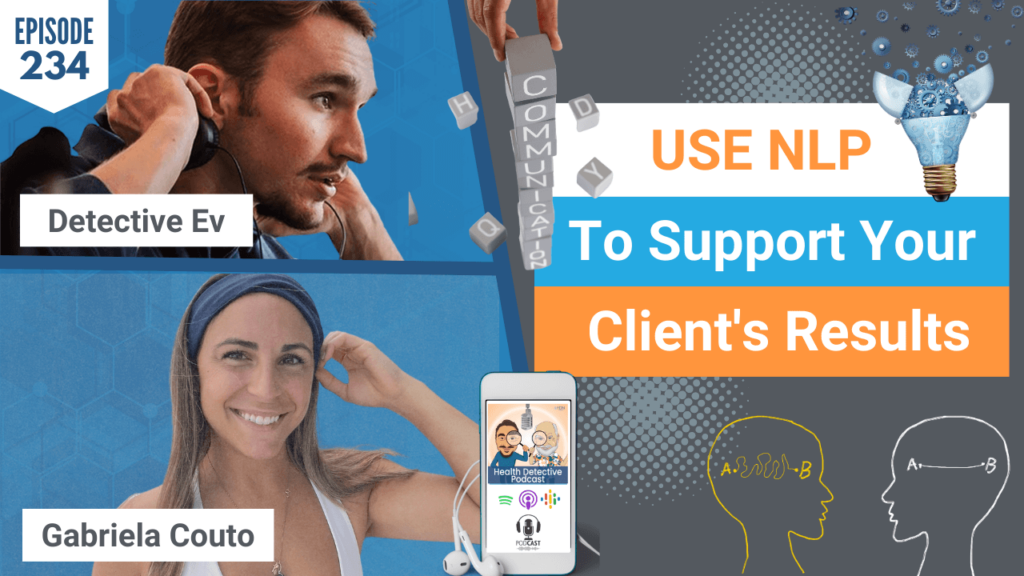Introduction
[00:00:00] Detective Ev: Well, hello my friends. Welcome back to another episode of the Health Detective Podcast by Functional Diagnostic Nutrition. My name is Evan Transue, aka, Detective Ev. I will be your host for today’s show about NLP.

If my voice seems a little shot to you, it is because we just got back from KetoCon 2023. What an event! Robin Switzer does it again. It was the biggest health event I have been to so far. Now, I did not really go to any prior to 2020, so keep that in mind. Man, she’s killing it and she’s bringing numbers back to these things in a time that it is so hard to do. So, huge props to Robin and everyone involved. Great job running an awesome event.
The next event I will be at is the CellCore one in the middle of May in Boise, Idaho. Never thought I’d be getting sent to Boise for a conference, but I’ll take it, man. That sounds good. I don’t have any extra time, but I would love to do some hiking. I’d also want my girlfriend with me and stuff. She’s from Spokane, Washington, and has done way more serious hiking than me. So, she’d probably be a great person to have for some of those hikes that could be going on in Idaho.
I really want to hit Bora Peak. It’s the highest point in Idaho. Not this time, but we will get them next time. Anyway, enough about that.
Book a Call – Enrollment Course Advisor
Hey, if you’re considering becoming an FDN and you’re listening today to learn skills that you can apply with your coaching clients, maybe you’re not an FDN yet, you can actually book a call directly with me now. You can hit me up at fdntraining.com/call and talk to yours truly. Just in case you somehow don’t already get enough of me on a weekly basis with this dang podcast, now you can book a call directly and talk about the course.
NLP: Gabriela’s Area of Expertise
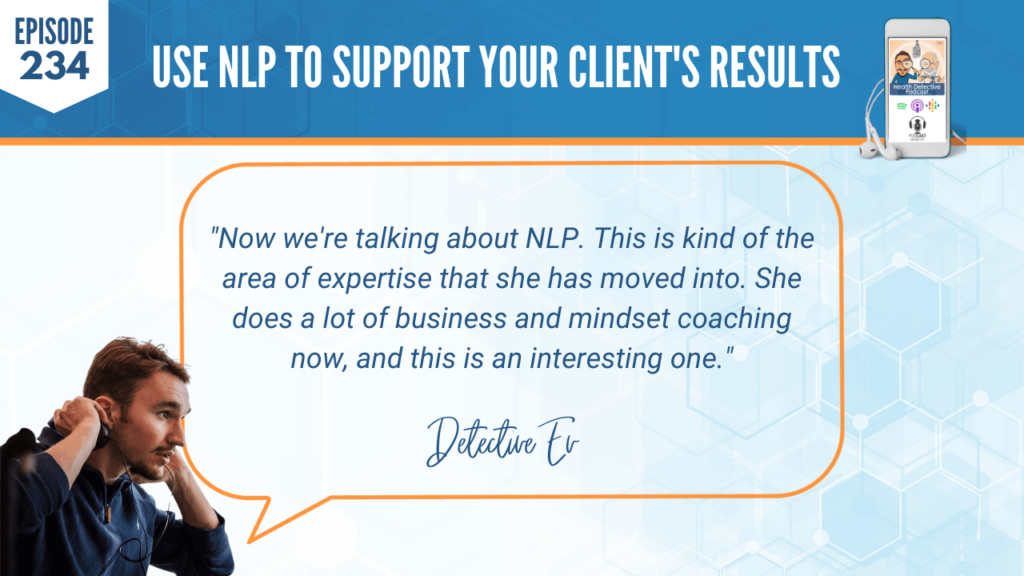
What we do have to talk about today though, is our friend Gabriela Couto is back. Last time she was talking about fluoride and the dangers associated with it. Now we’re talking about NLP. This is kind of the area of expertise that she has moved into. She does a lot of business and mindset coaching now, and this is an interesting one. I love getting to talk about anything personality related. I’m still waiting for a Myers-Briggs expert to hop on with me. But for today, we will have to settle for just NLP and it is a pretty darn good episode.
I hope you guys find some use from this that you can actually apply to your clients and your sessions to make them more effective. Without further ado, let’s get to today’s episode.
Hello Gabriela and welcome back to the Health Detective Podcast. How are you?
[00:02:20] Gabriela Couto: I’m doing well. Thank you again for having me.
[00:02:20] Detective Ev: I’m glad to have you.
We’re both cheesing right now. We were in a completely deep 20-minute philosophical conversation before we got on. And so, not that this conversation won’t be awesome but it’s undeniable that we’re having to come down a few notches to get back to this podcast today. It’s still going to be very cool.
I think it’s going to be fun in a unique way because Gabriela was on before. You guys might remember her if you’ve been listening for a while. It’s crazy that that’s been almost probably a year at this point. She used to work as a dental hygienist and got very interested in fluoride and what it was doing.
NLP: Non-Traditional Business Coaching
What’s interesting about you, which actually applies to our conversation even off air, is you don’t really strike me as someone who goes into researching anything with a strong opinion. And I admit, like I do that. So, it’s challenging for me sometimes. You’ll more go and say, okay, I’m curious about this, like, let’s see where the data leads or where the perspectives lead.
Your podcast with the fluoride thing, you never came across as some too far functional person where they’re like, oh, it’s the most evil thing in the world. And you know, they used it in the Nazi concentration camps, which is actually kind of true.
But I’m already thinking it’s bad and then I’m doing the research and now I’m doing it with a bias. You literally just had this curiosity and said, okay, I’m going to go figure this out. You were shocked by what you found and then how your professors even reacted when you presented them this information that you were presenting somewhat neutrally. What’s cool is we talked about that there. I’ll put this in the show notes, so please check out Episode 161 with Gabriela.
We just got a review recently where the person was very kind and said, can you please actually remember to link these episodes that you mention? So, I made a little note to myself that will actually be in this one today. So, check out Episode 161 there.

But Gabriela now, and we alluded to this last time, does, I don’t even know if we can call it business coaching in this traditional sense. It’s not like you’re helping someone lay out a spreadsheet or a marketing plan, although certainly the work could lead to someone executing on those things.
NLP: A Consciousness Coach or Mental Masseuse
You do something much deeper, and we’re going to talk about NLP today and other stuff. But just to be clear for the audience before we get into it, how do you currently define what you offer people?
[00:04:21] Gabriela Couto: I think it depends on who the person is. It’s kind of funny bringing the NLP into the conversation because it depends how you perceive things and how I can best relay that information to you.
There’s two ways that I go about it. I either say that I’m a consciousness coach in the sense that I bring the hidden conversations from your subconscious mind and merge that with your conscious mind. I bring that into awareness so that you can start to realize what you are focusing on and creating that reality or how you function and connect with other people.
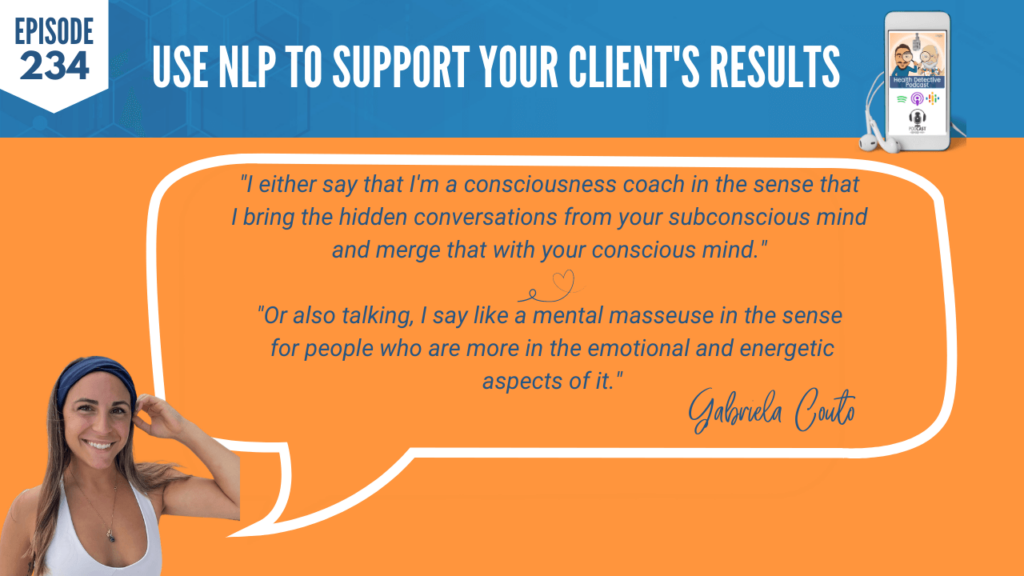
Or also talking, I say like a mental masseuse in the sense for people who are more in the emotional and energetic aspects of it. It’s kind of massaging the mental, emotional, and spiritual bodies. I say masseuse because most people go to a massage or has gotten a massage before, and they know that there are knots in their body that are limiting their range of motion or how they actually function and feel in their body.
So, if you can massage the mental and emotional and spiritual body, it’s removing those knots so you can actually think clearer and have a deeper connection with yourself and with other people.
[00:05:27] Detective Ev: I love the mental masseuse thing. Every now and then someone comes up with a tagline that just sticks in your head and now I’m not going to be able to forget that. That’s good branding.
NLP: Hitting a Year-Old Goal
With the NLP thing, how we’re going to connect this for you guys today is twofold. One, we’re going to talk about some stuff that you can immediately apply to your own business working with clients. Then perhaps something actually might resonate with you today where you would like to work with Gabriela. That could be also something to do there.
Gabriela and another good friend of ours at one point were working together in kind of separate categories, but they offered something together, so I worked with them. What was interesting, and to be fair to you, I never even really connected this until a few months ago. I never even gave you guys enough credit for this.
The work that you guys had done, I had a very specific income goal at that time, as you remember. What happened is in the next two months, I mean, I hit that, and I’ve been able to mostly maintain it. I’m in fact, far exceeding it some months.
What’s funny is, the other person that we worked with, she helped me in a different way over the long term, but at that time there was nothing really that I had done with her that led to that at all. So, it’s like there’s really only one thing that I did. It was the direct work I was doing with you.

To me, as deep as I am into this, some of it initially seems like far out. But then you feel like kind of a lightness, and you can see how it’s working in your life. It’s hard to deny that it didn’t do what I wanted it to do because I had been working on that goal for over a year.
NLP: Neurolinguistic Programming
Then within a matter of two months it happened and maintained. When something maintains, especially that, to me is a true shift in consciousness. That means like, all right, cool. We have put ourself now on this plateau, and then there’s the next one and the next one, and you can keep going further. So, with NLP specifically, that’s probably the most applicable thing that people can take today, maybe not even having heard of it and apply it to their clients.
Just to be clear, what does NLP stand for and what’s your background in it? Cause it’s kind of extensive.
[00:07:15] Gabriela Couto: Yeah. I first just want to say that’s amazing. Congratulations! Just to hear that evolution for you is so profound. Thank you for sharing.
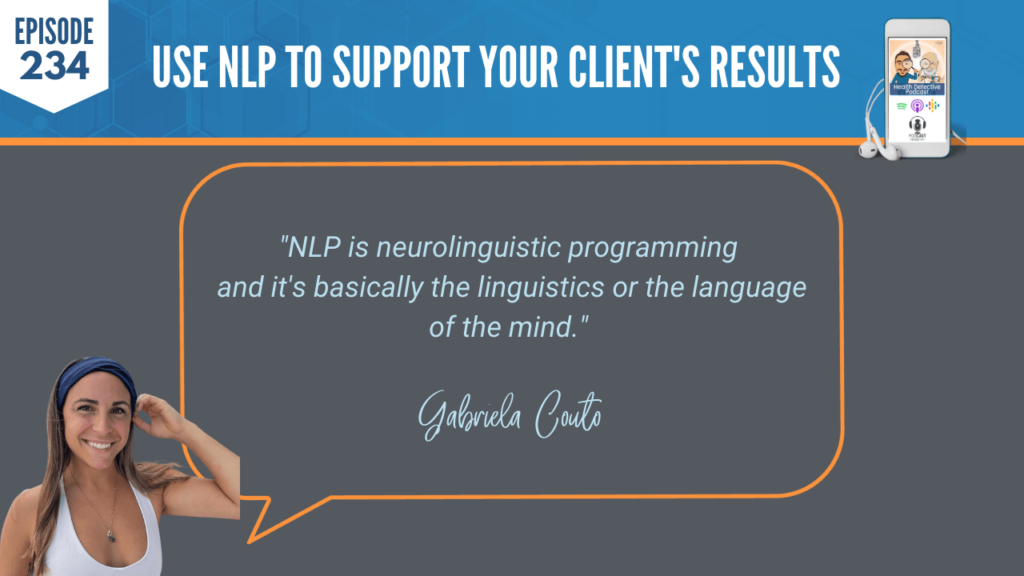
So, NLP is neurolinguistic programming and it’s basically the linguistics or the language of the mind. It’s being able to understand how you function and how your brain communicates with other people. When you can have a better understanding, essentially labels to what communication is, then you can understand how other people communicate and you start to pick up on their language patterns. You can have deeper connections with people because you also understand yourself more.
[00:07:51] Detective Ev: Then in terms of your training with it when did you start becoming interested in that? Because you’ve been talking about this, honestly, as long as I’ve known you, I feel like.
NLP: Learning to Take Responsibility in Communication
[00:07:57] Gabriela Couto: It was actually kind of funny how it presented itself into my life. I was, again, dental hygiene before and I went to an acupuncturist. I saw this book on water and I was so fascinated with it, so I read it. The same day that I actually finished it, and the book talks about NLP, my sister comes in the room and she’s like, hey, this team is coming in to teach NLP. Do you want to take it with me?
I was like, are you freaking kidding me right now? Like, What? Like, who even hears of NLP? So, I was like, if I can get the time off of work, then yeah. I’m so down. I got time off so easily. It just flowed so well. I really did it for me to kind of understand myself a little bit more.
Then I was so infatuated with it because I have struggled a lot with communication growing up and feeling a lot of being misunderstood. That’s also created a lot of other anxiety for me and social anxiety essentially. So being able to tap into that and learn for yourself, I realized how this can also help and serve other people.

It’s essentially putting responsibility on your end in the sense of like, okay, it takes two to tango. So where is my responsibility? When you can take responsibility with your actions, your patterns, your responses or reactions in general, then you have the awareness and the control to make that switch in that chain so that you can actually create that life that you want.
NLP: Applying What You Learn Is Powerful
Kind of like our conversation earlier, like it’s not easy, it’s not the most pleasant. I had to have a confrontational conversation with somebody today actually, and confrontation has always been something really hard for me. Being able to overcome that, that’s when you start to grow. That’s when you can actually learn and apply all of these lessons.
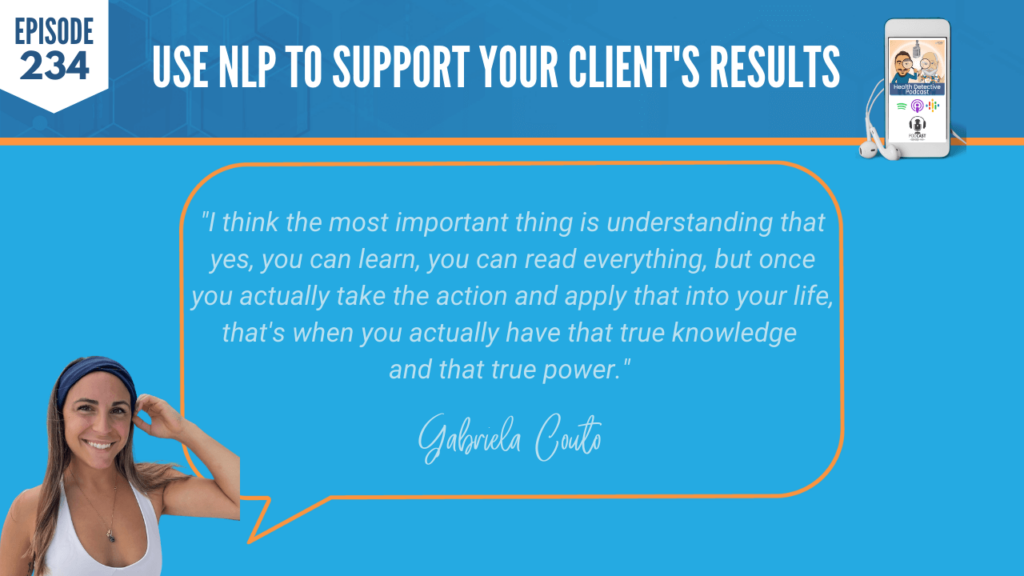
I think the most important thing is understanding that yes, you can learn, you can read everything, but once you actually take the action and apply that into your life, that’s when you actually have that true knowledge and that true power.
[00:09:54] Detective Ev: Nice. I never knew the part about, for whatever it’s worth, you never struck me this way. This is cool. I never knew the part about struggling with communication and stuff. I find that interesting cause it’s not necessarily equitable to NLP, but NLP is a system, right? It’s, in a sense, a way to type people and figure out maybe how they’re communicating. That’s obviously, basically what it is. And then you were able to adjust accordingly for that individual.
That’s the same reason I got into the Myers-Briggs thing. I knew, I’m like, well, I’m a decent person, I feel like, and yet, I’m having these communications with people and it’s coming across completely wrong. At some point we have to look at ourselves and say, I’m the one that’s consistently having these problems.
Seriously, at one point in my life, it’s probably like eight out of 10 times I’m having communications with people and it’s not going the way that I want it to go. It doesn’t mean that I’m inherently flawed. It doesn’t mean that you’re inherently flawed.
NLP: Communicating in a Receptive Way
But I’m probably the one that has the most opportunity for work here if I’m the one that’s having the problems consistently with such a variety of people. That’s why I studied that cause now I’ve learned how to appropriately say something to certain people.
Guys, this is not to be mistaken, cause I hear this 5% to 10% of the time where people mistakenly believe that this is somehow an attempt at manipulation or something like that, that that’s not the case at all. If you used it that way, that would be the case, but I don’t use Myers Briggs that way.

Like I know Gabriela’s type, I know my best friend’s type, I know my girlfriend’s type. I do this to display information in a way that they will be receptive to. So, if my idea is like, hey, we should go do this on Friday night, I’m not changing the idea or hiding it, I’m just presenting it to them in the way that might be most receptive to them and that they can understand so that we can at least make a decision about the idea.
With NLP, the thing that I’ve heard before is visual, kinesthetic, and auditory. I know that’s probably loaded, but can we break that down and what that actually means?
[00:11:36] Gabriela Couto: Yeah. I first just want to touch up on the first part that you mentioned. I think that’s really good and it’s a really good way to conceptualize what NLP is and kind of like what you were saying the Meyers Briggs is. It’s you understanding the other person and that’s essentially what NLP is. It’s understanding how that person communicates now.
NLP: Visual, Auditory, Kinesthetic
So, it’s putting essentially a label to them, but it’s also realizing it’s just a label. Labels essentially creates boundaries. But also, how can you expand those boundaries?
Yes, I’m an INFJ, but I’m so much more than an INFJ. You know, it’s not holding me to that. Even with the term manipulation, yes, people can say it is manipulation. One, it depends on your definition of manipulation, and that’s where NLP comes into play. It’s really understanding your definition of what these terms are.
Manipulation, it’s your internal representation, your connotation. Is this a good connotation, manipulation, or a bad? It’s the same word as influence. You know, you can influence somebody in terms when if you influence, you’re manipulating them. And so, it’s just realizing, oh, I have a negative IR. Where did that come from? When did I start to define that manipulation of something bad? And you can also manipulate somebody into something positive.
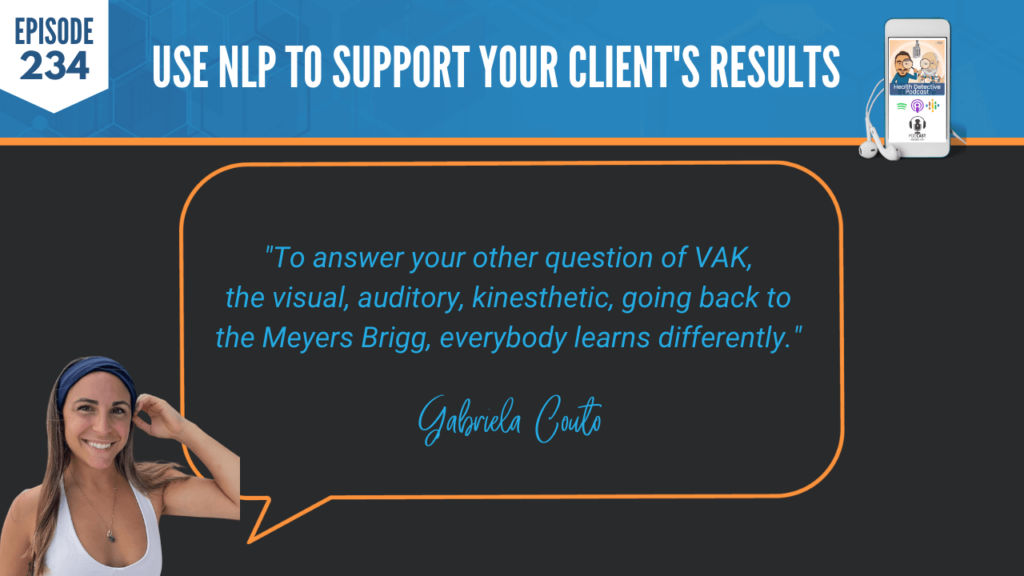
So, to answer your other question of VAK, the visual, auditory, kinesthetic, going back to the Meyers Brigg, everybody learns differently. People can visualize things, or they really have a good memory because they can see it in their mind’s eye.
There are some people who they hear and listen to podcasts. It is something that is easier for them to obtain that information versus somebody who can see it through pictures or through a movie.
Then there’s the feelers. People who are better at learning by experience. They have to go through that experience to actually learn the connotation.
NLP: The Different Categories and Their Values
Then you can understand how somebody operates. It’s even using your words, oh, I see what you’re saying or, oh, that resonates with me. Resonating is somebody who is good with auditory versus visual person. Oh yeah, I see what you mean. It’s starting to pick up on those little key words, and that’s where you start to understand how they communicate.
[00:13:50] Detective Ev: Okay, cool. I don’t know if it’s this simple, but like is there types with this? Would you say someone’s like this type primary and then secondary, tertiary, or can everyone be a little bit of all that stuff on a different day? That part I’m not familiar with.
[00:14:04] Gabriela Couto: Yeah, I think it’s all relative.

So, another aspect of NLP is understanding what your values are. You have different categories such as relationships, career, personal development, and you have different values for each.
It’s being able to understand like, oh, maybe when it comes to learning through business, maybe you actually have to see somebody do it first and then do it yourself first. Versus there are some people that they need somebody to guide them through the experience first, or maybe they just learn instantly just by seeing it and they get it. I think everything is pretty relative.
The other important thing to understand, because when you can understand communication and how somebody listens, another concept is, are you an inferential learner or listener or talker, or are you literal? You can have one of each. I’m a very inferential person when I speak, but I’m very literal when you speak to me. You have to be extremely specific with what you mean, because if not, I take that literally.
NLP: Inferential or Literal?
[00:15:08] Detective Ev: I feel like this is me. This part’s definitely me. That is tough. Like you can know what it means, but then it’s hard to think of examples. I hear you on this.
I always remember, like when I worked at my parents’ restaurant when I was a kid. I would sometimes, like at 17, drive over to get certain things. I constantly had this issue where they wanted me to get certain stuff, but they never said it directly.
It might have been like, get the stuff for the back office, right? So, I go to the back office really quick, and I see this is empty versus like maybe something was low. They’re like, well, I wanted you to get everything that was low. I’m like, how about you give me a list of things to get, and I will happily get it with a smile on my face?
I needed to know the specific items in the quantities that we are getting them at the price that we will buy them. Then I will go do that. I don’t know if that helps spark your example at all, but I feel like everyone’s always told me I’m very literal. I just resonated with that word when you said it.
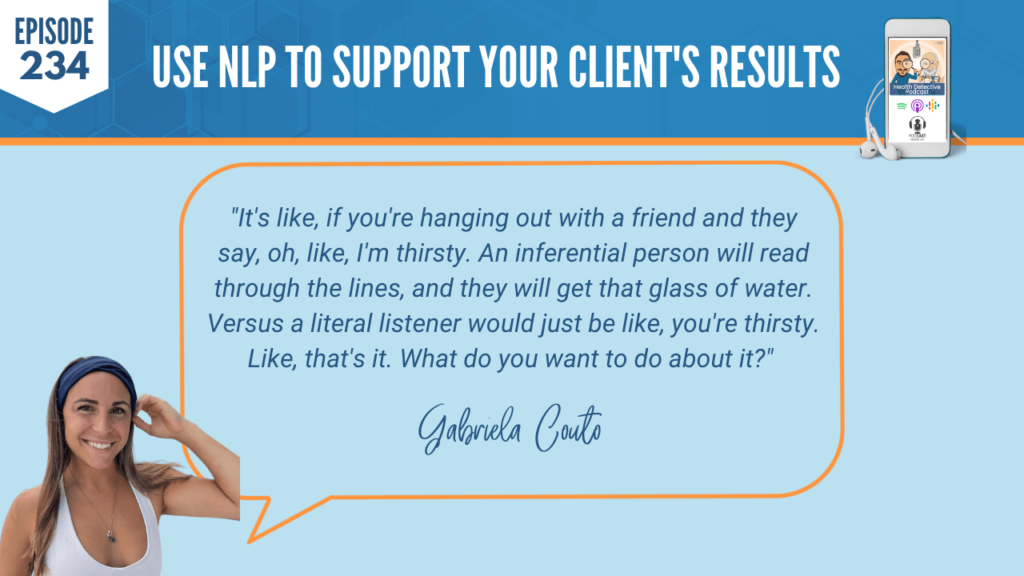
[00:15:54] Gabriela Couto: So, like, yeah, inferentials, reading in between the lines. The example that they give an NLP, I guess it’s the best example that I can really give. It’s like, if you’re hanging out with a friend and they say, oh, like, I’m thirsty. An inferential person will read through the lines, and they will get that glass of water. Versus a literal listener would just be like, you’re thirsty. Like, that’s it. What do you want to do about it?
NLP: Recognizing the Shifts
It’s also realizing how do you speak? Are you a very literal person to somebody who’s inferential where they will read in between too much in the lines when you’re already literal or are they literal? I think that’s so important to understand within business dynamics or in real estate or anybody that you kind of communicate and have a bigger purpose with is understanding how they communicate.
[00:16:41] Detective Ev: Gotcha. Not to put you too much on the spot then here, but we’ve worked together and know each other well enough. If it’s that circumstantial that it can be different between business and interpersonal relationships and intimate relationships or whatever, fair enough.
Do you recall, or do you know offhand, like when you were working with me? Obviously, you’re picking these things up then, so was I getting typed by you with these letters? Like did you know which styles I communicated with or received better?
[00:17:06] Gabriela Couto: To be honest, no, not necessarily. Really putting me on the spot. Sometimes I think it’s also an intuitive thing.
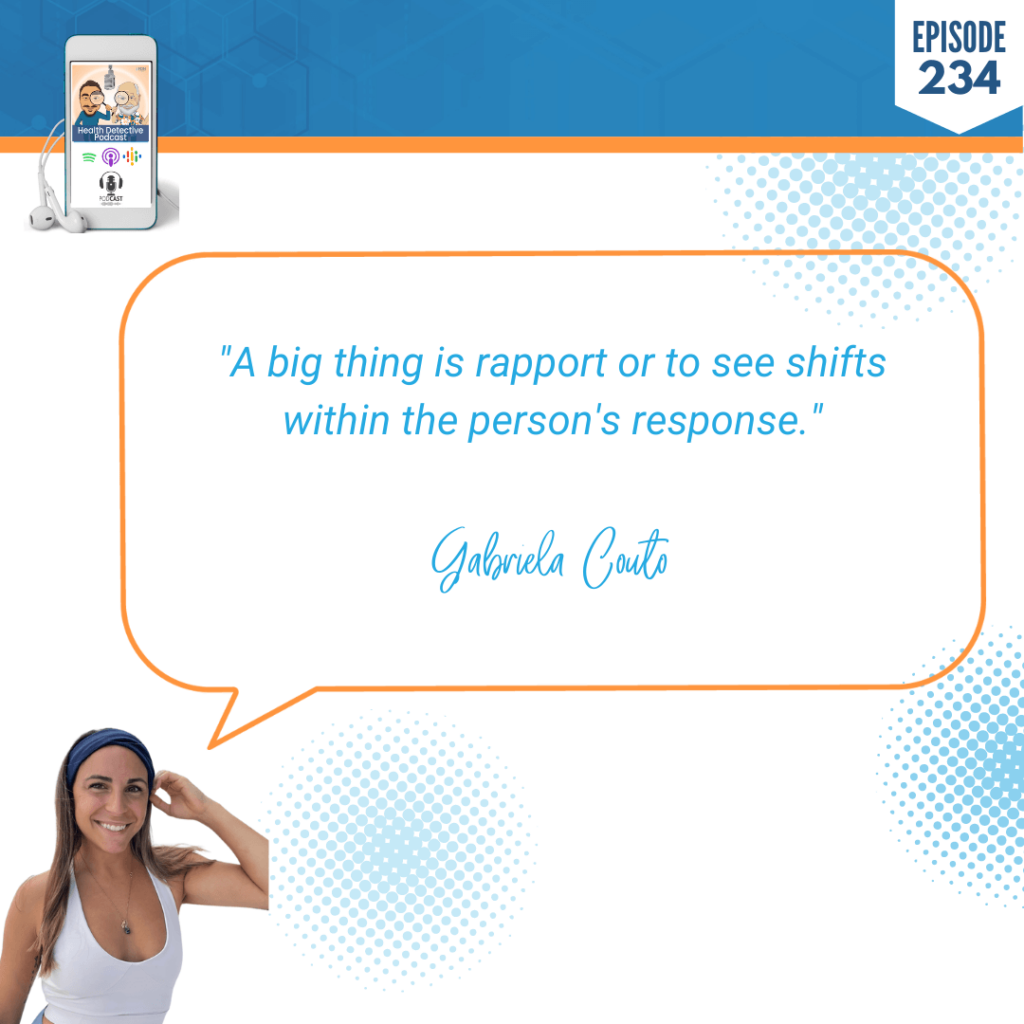
A big thing is rapport or to see shifts within the person’s response. So, if there’s a shift in their voice or their breathing pattern or a result on their face, it’s being able to tap into that aspect and seeing, okay, there’s a shift. Are they understanding me or not?
And again, you can have a shift and that could be you understanding something, but somebody else could blink, say it’s blinking faster. To you that’s processing it, but somebody else, it could be like, I’m so confused. So, it’s just kind of understanding that person.
NLP: Automatically Typing People
Essentially, you’re building that rapport with them. It does kind of take time to understand what their shifts are. I think just because I do know, or I had known you before then, that I was able to understand those shifts. But these are just like different categories or different ways that you can have a better communication with somebody.
[00:18:07] Detective Ev: Fascinating.
All right, so then with clients, obviously this can go pretty deep. I don’t expect anyone today to have this mastered, that would be ridiculous. But I know for myself, and this is something I do naturally now, I can’t help it. I, for better or for worse, am so obsessed with the Myers-Briggs thing, and it won’t leave. It just stays for all these years.
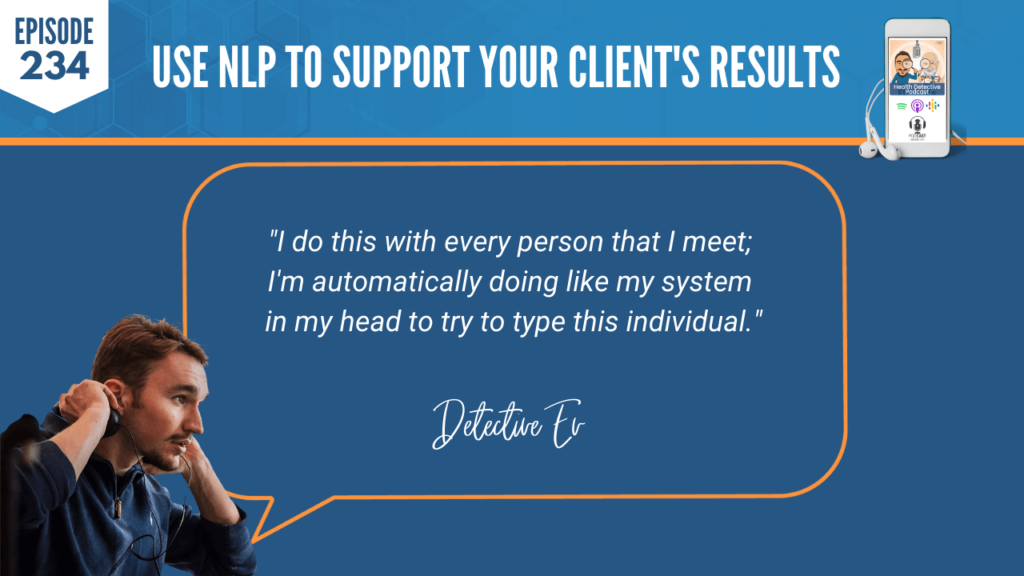
When I am talking to someone, I am not even thinking about this anymore. I do this with every person that I meet; I’m automatically doing like my system in my head to try to type this individual. I think in a way that is not particularly visual, it’s not blank, but it’s not particularly visual.
I’ve always been very good at like memorizing letters and numbers. That’s where I excel. We can drive on the road and pass a phone number for half a second. I can be like, all right, here’s the phone number. But I can’t remember the eye color of someone that I maybe talked to for 20 minutes, like that would be very challenging for me to do.
NLP: Helps with Building Rapport
My point in mentioning that is I’ll have these memories sometimes. And Maddy, I don’t know if she likes this, but she’s an INTP and my best friend’s an INTP, so go figure, right? I have these two very close people that meet the same type. There are times where I think I said something to her or I’ll be talking to him and I think I said something to him and they’re like, you didn’t talk to me about that.
Now, the memory in my head, I realize, is not Maddy or Brian, it’s INTP. I’m literally picturing the letters and that’s where I’m like, oh no, I said this to the INTP. And they’re like, not this one. You know, maybe the other one in your life, but not this one. I think it’s kind of funny how I’m so systematized in my head that that’s how I’m doing this.
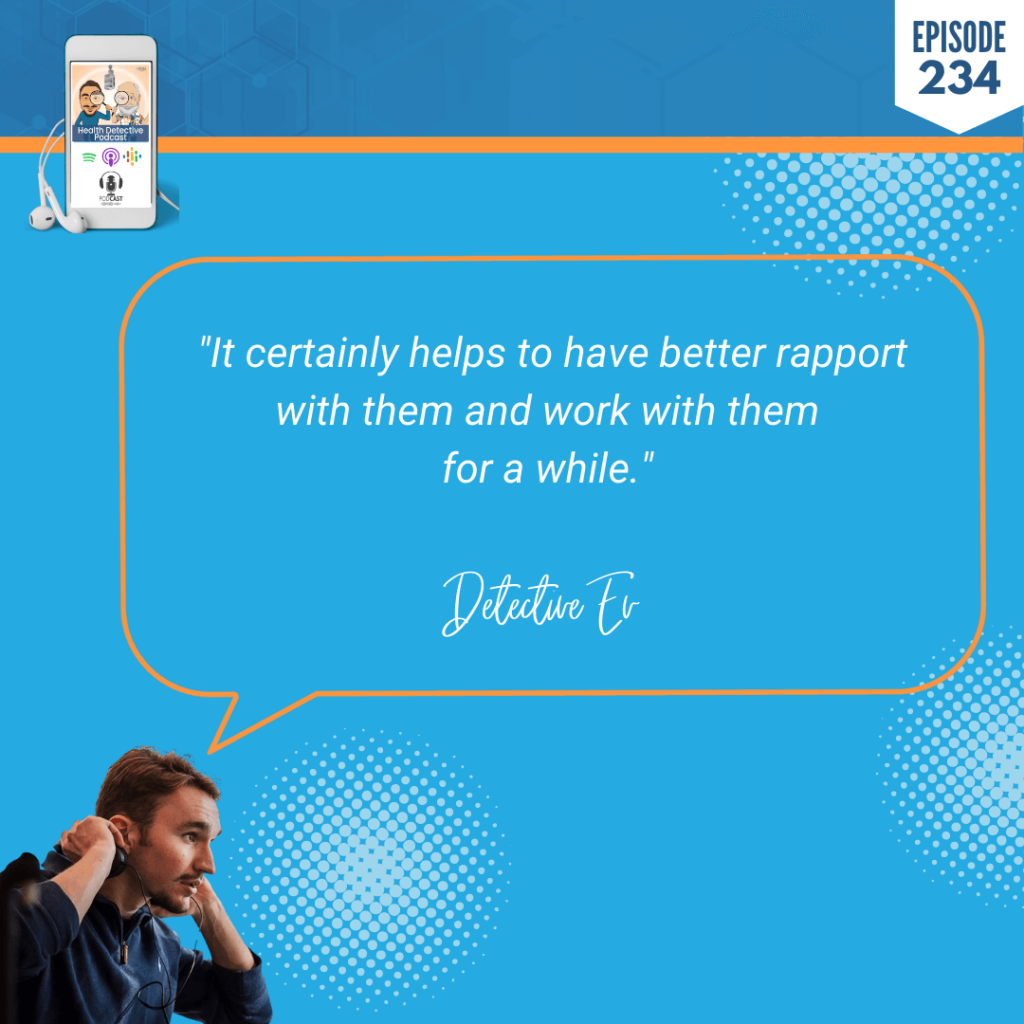
I’ve been doing it for a while though, so I can do that pretty quickly. It’s not accurate a hundred percent of the time, but I can get a good feel for people. It certainly helps to have better rapport with them and work with them for a while. But the advantage to our practitioners is they do work with their clients for a while.
Let’s say I am a practitioner. Maybe I have like 2, 45-minute interactions with a client and we’re getting pretty deep. They’re talking about maybe their worst health issues, their struggles; clients get pretty open with us. Is there some basic stuff that I can start looking out for that you could teach us maybe from an NLP perspective that might help us at least get into the VAK thing. Maybe some things to listen out for or watch out for?
NLP: Listen for Cue Terms
I’m trying to hit on all of them right now to see where this person’s at and what type they might be.
[00:20:16] Gabriela Couto: I think that it is cool to have the ability to have these concepts and even to like categorize somebody as an INTP versus an INFJ. Does that also put somebody in a box and limit them from other possibilities that they could step into and listening? With these techniques, I think it is important to learn but not putting it on a pedestal like this is all or nothing kind of thing.
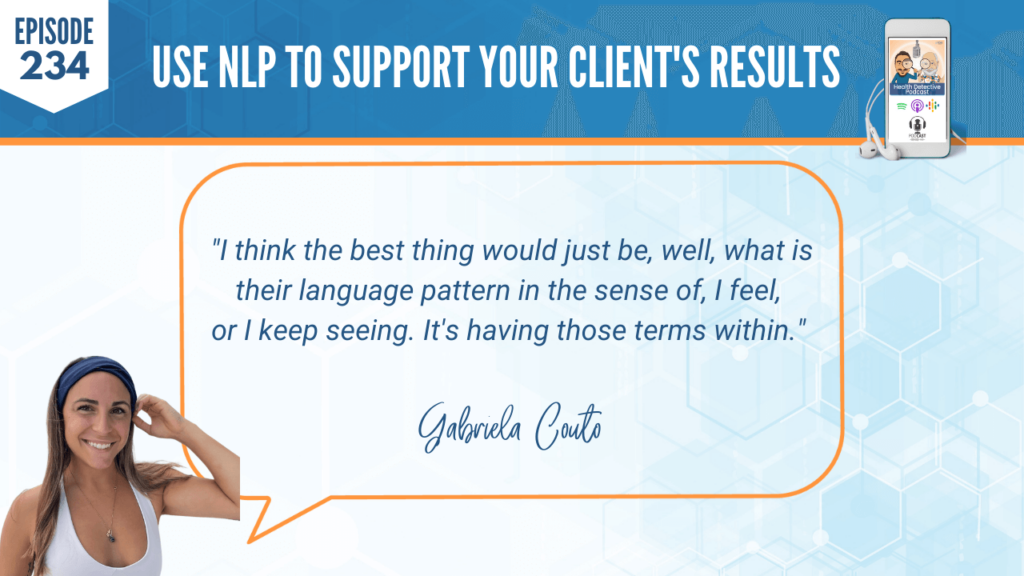
I think the best thing would just be, well, what is their language pattern in the sense of, I feel, or I keep seeing. It’s having those terms within. I can also send you this too. There’s like different words and terms that certain people use if you are a feeler, like, oh, I feel this way. I’m trying to think of an another. I don’t focus too much on this aspect, but I think it is a cool concept for people to learn and just picking up on those terminologies and the rapport building.
So, do you notice a shift in their face when they understand something and ask them, oh, I noticed a shift in you. What did that mean? Kind of just asking them what is really going on in their mind to really understand what their shifts are. Because then, you will pick up on those patterns of that person individually versus these categories oh, you are a VAK. But I think for the most part, a lot of people actually know the way that they learn.
NLP: Converting Your Language Pattern
So, like I’m a very visual learner and a feeler. For me, I’m a visual.

So, asking a person like, how do you typically learn? Like are you better at visualizing? Are you better at listening, or are you more with experience? Then having that answer, I think, it’s just converting your language pattern to fit what they respond to.
[00:22:10] Detective Ev: Okay. It can be pretty simple, honestly. It’s just asking questions and taking the time to do that investigative work. So, okay. I’ll use myself as the test dummy here. I’ve done this.
Someone came on that does Enneagram. We had like this whole psychoanalyzing session. It was kind of hilarious. I won’t put you through that, but that was pretty funny. Like we went through this whole thing.
So, for myself with what I already brought up, like if I read a book, that is the easiest way for me to retain something. When I see only words and numbers and I get to see the words and numbers, I can be sometimes perfect retention. That’s always been a nice thing.
The secondary thing I would use is like podcasts, I can do pretty well with. Even if I hear a stat. Let’s say it said 20% of people that do this get this result. I remember it, but even that, I almost have to put it through like my mind first. It literally feels like my mind is like this blank slate sometimes. You know, a computer programmer, like how they would type on like a black screen? That’s what it feels like.
NLP: Everyone Has a Different Sequence
I could even, in conversation, it’s hard for me to do this and focus a hundred percent admittedly, but if someone talks at an average pace and not mine, which is like, 2X, always constantly without caffeine, I can almost take the words that they’re saying if I wanted to and play it as if it was like a typewriter across my mind.
So, if you said the whole VAK thing, again, I’d be like, okay, VAK, like I’m seeing those letters. It almost seems to be that order for me where it’s like, there’s this visual aspect, if I see it, very helpful. Then auditory is good, but I might start messing up the percentages a little bit. Cause it wasn’t a perfect translation from my ears to this syntax in my mind. And then I think the last one by far for me is the kinesthetics.
Do you think this is accurate based on what I said? Would it be, what is that, VAK then in order by coincidence?
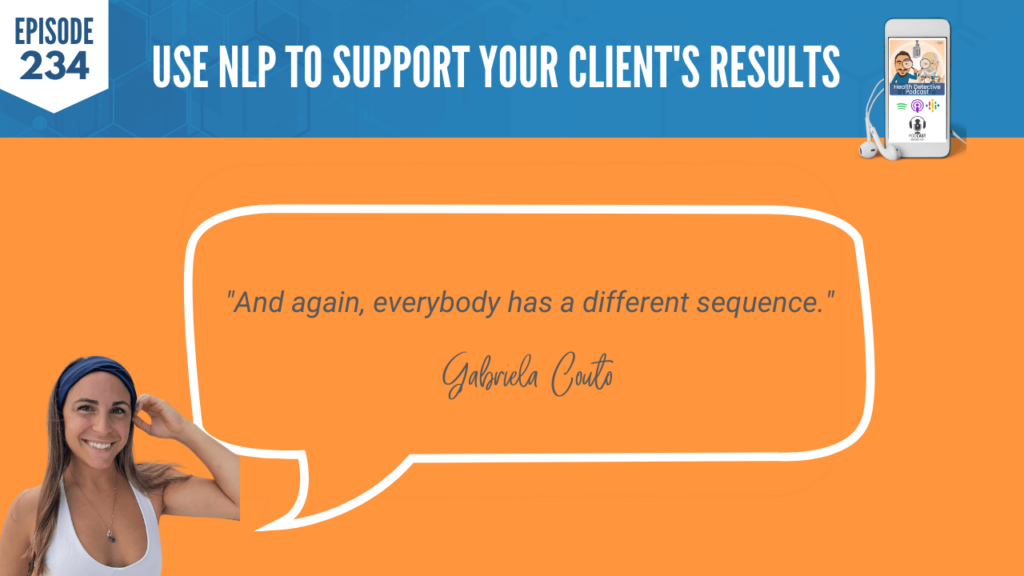
[00:23:45] Gabriela Couto: Yeah. And again, everybody has a different sequence. A good analogy is like, how do you buy something? Is it because it looks really pretty? Is it because the sound of it or you can hear other people complimenting you on it? Or does it feel good? Like is it the material? It’s seeing how you make those decisions based on what you’re going to buy. Is it from an external validation or does it make you feel good?
The other concept that I actually wanted to bring up is eye patterns.
NLP: Eye Patterns
For me, when I was studying in school, I would always look up. I never understood this, but I actually had a friend call me out. She’s like, you always look up at the ceiling whenever you’re trying to remember something or studying. For me it’s literally VAK. I always get this confused because it’s flipped based on who you’re looking at.

The right side is remembrance. So, if I’m looking at you, and it’s on my right side, your left, it’s all remembering. So, you are visually remembering. If it’s neutral towards the side, you are auditory. You’re remembering what you heard. And if it’s down, you’re remembering what you felt.
On the opposite side, it’s the creative side. So, the left side, if your eyes go up towards the left, you’re creating a visual. Like, think of a blue tree, then you’re going to think of a blue tree, typically, your eyes to the left. And then auditory is towards the middle. You’re constructing the feeling if it’s looking down.
The only thing important to know is that if people have gone through a lot of trauma, then that can also be flipped. So, it’s also understanding your client and if they have experienced that trauma, then it might be flipped.
[00:25:26] Detective Ev: What’s interesting about this is I feel like the whole eye thing is something that, even five, six years ago, you see on like Facebook almost as a little guide where it’s like, how to tell if someone’s lying. Then they have this eye chart. I know it’s definitely not that simple. But was this a concept that came from NLP originally then?
NLP: Do Eye Patterns Reveal Lying?
[00:25:41] Gabriela Couto: Psychological wise, I think so. I mean, NLP is, in the sense of it’s in the psychological range or concept. To say if that was the origin of it, I don’t know about that.
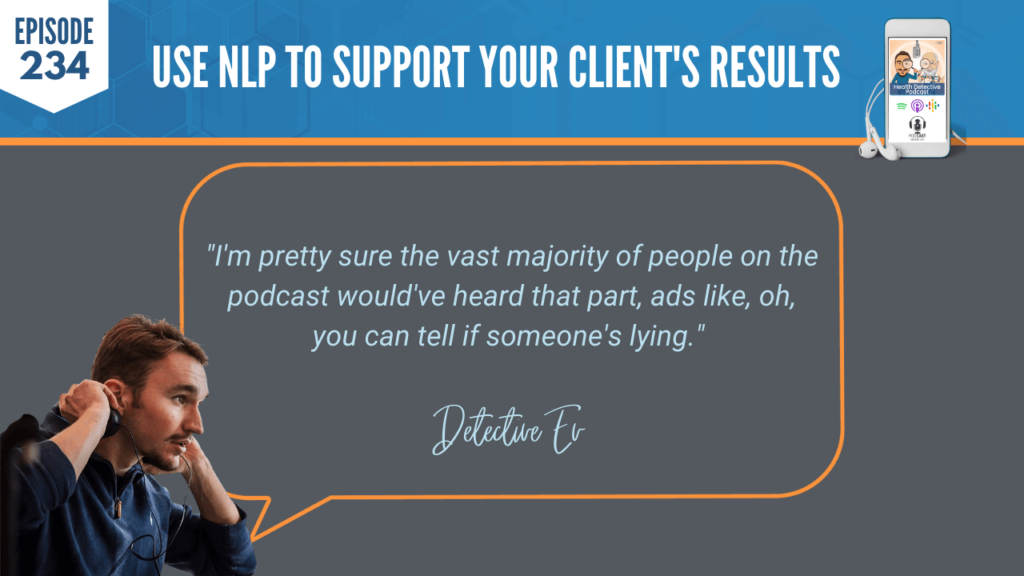
[00:25:54] Detective Ev: No worries. I’m sure it’s older than Facebook, so we can at least say NLP had it before Facebook ever had it. I’m pretty sure the vast majority of people on the podcast would’ve heard that part, ads like, oh, you can tell if someone’s lying.
But one thing that you already said that I feel like would be totally misleading about memes like that then, because it’s just overly simplistic, is all right, well, I’m not seeing actual objects. I see text and numbers a lot better, but I can create an image that’s just very crappy and grainy.
Maybe everyone doesn’t see it like this. How I see my dreams and I recall dreams, it’s almost like very faded. It’s not like I’m there, I don’t know how to describe it. It’s nowhere near as present as you and I are right now when I’m looking at you. Maybe everyone doesn’t see their dreams like that, but that’s the only comparison I would’ve used is dreams.
But my point is, if you said that blue tree example for example, you could have said, well Evan, did you see the blue tree on your walk the other day? I would be creating that image, trying to figure out like, oh, did I see that blue tree? And then the Facebook meme would say, oh, well he’s lying cause he’s creating that image. It’s like, well no, I couldn’t see it to begin with, so that’s why I have to reconstruct this thing in my head.
NLP: It’s Not Right or Wrong, Just Different
So, is that really a good way to tell if someone’s like lying or not? Especially considering how controversial that can get, should you be banking on lies based on eye pattern or should you use it more for this reason to help people?
[00:27:08] Gabriela Couto: I would say use it, I’m always for helping people. They didn’t really say anything about lies. That’s more psychology versus NLP, the language pattern.
I do think it’s cool to understand the subconscious mind and the reticular activating system. Because now, again, it’s brain, that awareness. Oh, I wasn’t aware of that blue tree, so the next time I’m going to go for a walk, I’m going to notice that blue tree and putting that into perspective.
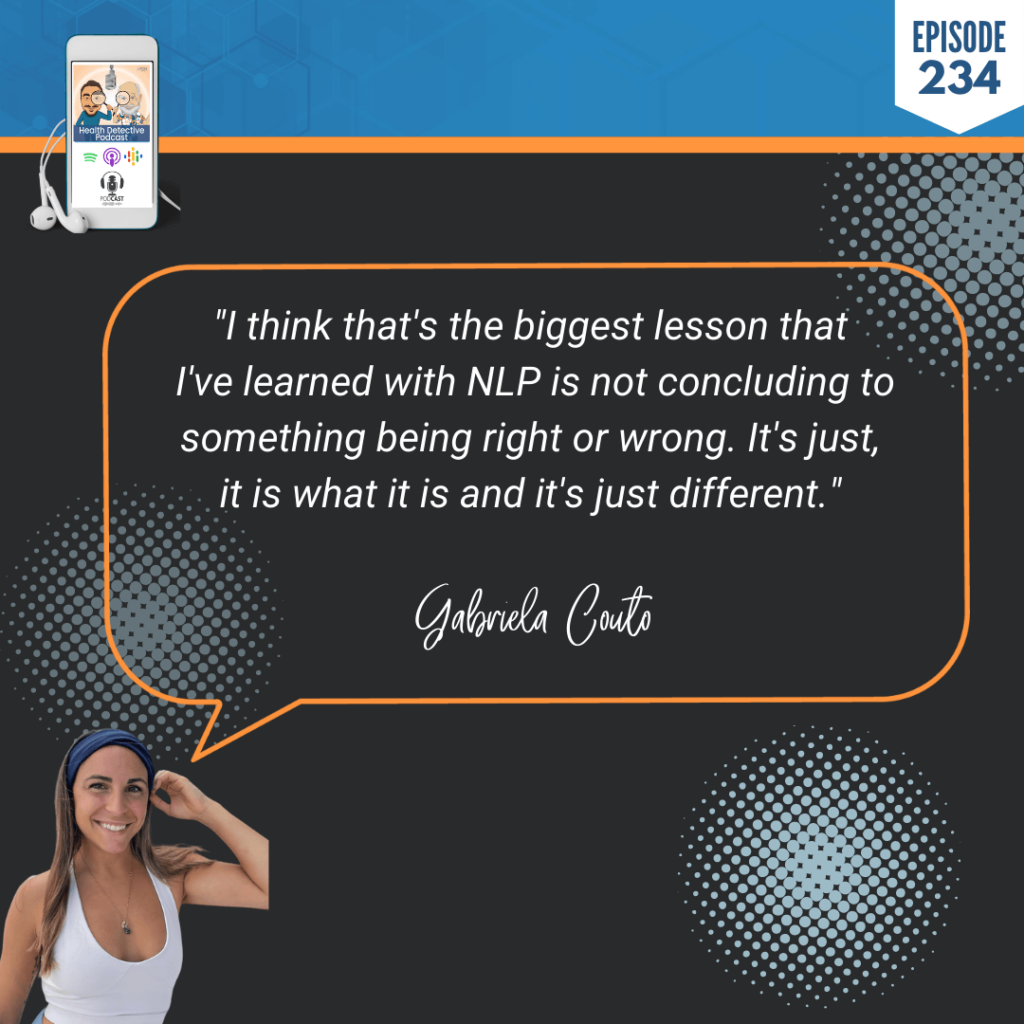
But even kind of like you said, how your dream was a little bit faded, everybody has their own way of thinking and creating these images. It’s not to say it’s right or wrong, it’s just different. I think that’s the biggest lesson that I’ve learned with NLP is not concluding to something being right or wrong. It’s just, it is what it is and it’s just different. It’s observing that difference versus having an expectation. Cause once you start to have that expectation, then that leads to more disappointment, so to say.
[00:28:11] Detective Ev: Got it. All right, so, I’m your client. Let’s say you’re one of our functional practitioners, right? You hear what I just said, and correct me if I’m wrong, because I know that visual’s probably normally a little more expansive. Like maybe people like see actual.
NLP: Different Perceptions but Same Type of Learner
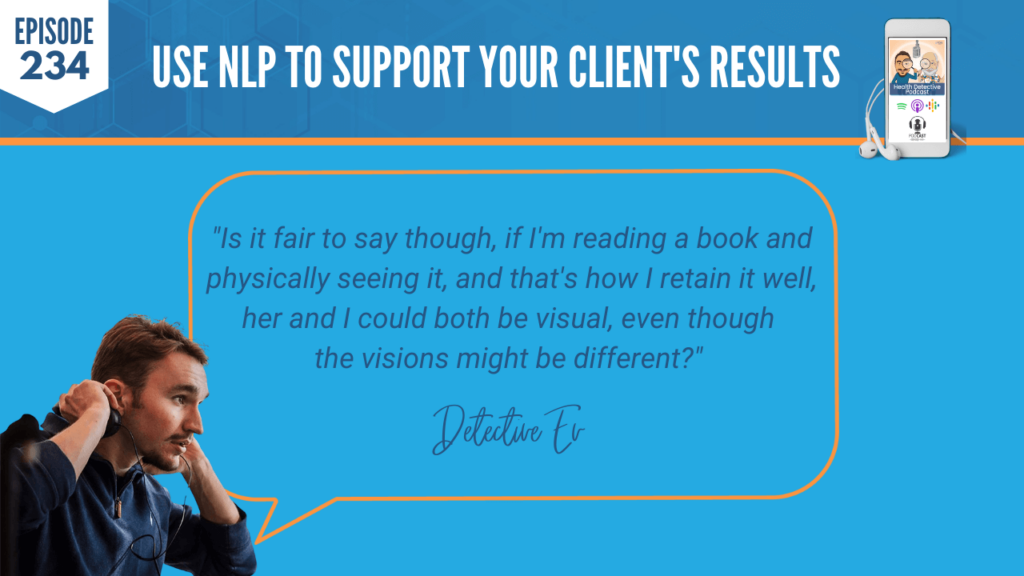
Like Maddy, my girlfriend, she has these vivid dreams and has a crazy imagination where she can clearly see the actual scenery of what’s going on. Where I just don’t have that. Is it fair to say though, if I’m reading a book and physically seeing it, and that’s how I retain it well, her and I could both be visual, even though the visions might be different?
[00:28:44] Gabriela Couto: Oh yeah. Absolutely. Yeah. Everybody perceives it in their own way.
[00:28:48] Detective Ev: All right, so then assuming that I’m a visual person and I’m your client and you’re a functional health practitioner, how then can I support someone through some of these protocols that we’re doing? Like one of the issues that we have maybe sometimes is the person being compliant to what we’re recommending.
Like let’s say, hey, well we notice on the labs that you have this, this, and this thing that you’re sensitive to. It’d be great if you could remove this for a little bit and the person’s having trouble complying with that. What might be useful for someone like me who’s a supposed visual person in like raising compliance. I feel like this could be really useful for our practitioners.
[00:29:21] Gabriela Couto: Yeah, that’s a great question. What I would say is kind of giving them the visual of why it’s important. So, to say like, would the symptoms continue to happen if you didn’t comply with it? And what would the results be if you did comply with it? So that they can start to visualize that and say, like, imagine. Imagine if you continued.
Using NLP to Solidify a Protocol
So, the “imagine” term word is that visual aspect. It’s using that term like, okay, imagine yourself and putting that person into that perspective or that reality, using their imagination, what it could and couldn’t look like. Then for them to have that understanding like, why are you doing this? Like you came for a reason; let’s comply.
[00:30:08] Detective Ev: I feel like, yeah, I’m starting to pick this up. Again, it’s surface level understanding right now. But then I’m thinking, okay, for the kinesthetic person, so that’s someone who feels. Going to my example, I’m always fine with talking about the stuff I dealt with. It was the cystic acne was one of the main things that always bothered me. Unfortunately, that’s an easy thing to imagine with me.
You would just be like, well, imagine what it looks like to have that. Now I can picture that just fine. Then that triggers all these feelings and stuff, and I don’t want that. So, okay. It makes sense that that would get me going.
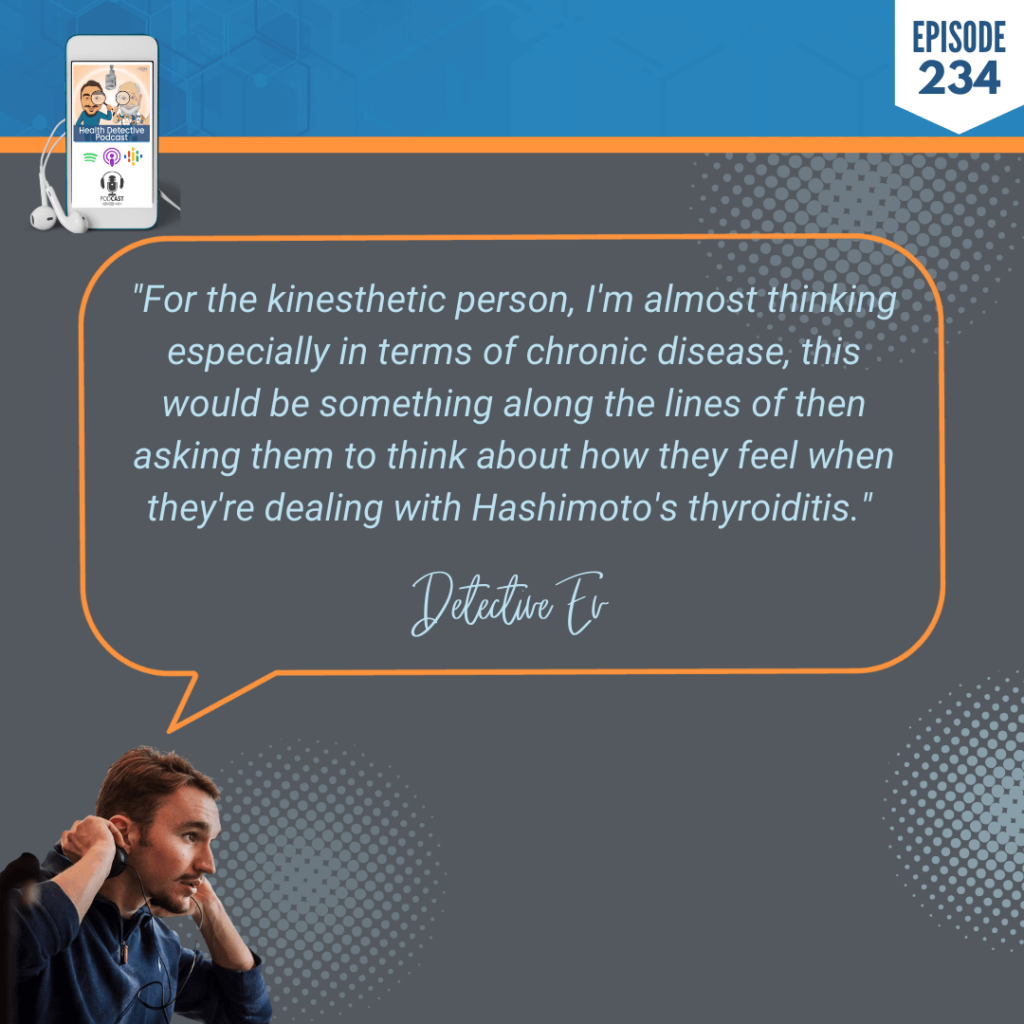
For the kinesthetic person, I’m almost thinking especially in terms of chronic disease, this would be something along the lines of then asking them to think about how they feel when they’re dealing with Hashimoto’s thyroiditis. And they’re like, oh, I’m tired. I can’t help my kids. It makes me feel sad. So, that would be how you’d kind of communicate with that person then to solidify the protocol a little more?
[00:30:57] Gabriela Couto: Exactly just like that.
NLP: It’s Like Setting a Goal
It’s putting that into the perspective of how they’re going to feel and how’d it feel to not have that cystic acne. Then they can start to understand. Or it’s creating that feeling, even though it doesn’t necessarily exist. It’s still creating that feeling of potentiality of like, oh, this is how I could feel. This is my goal; this is what I want to feel like.
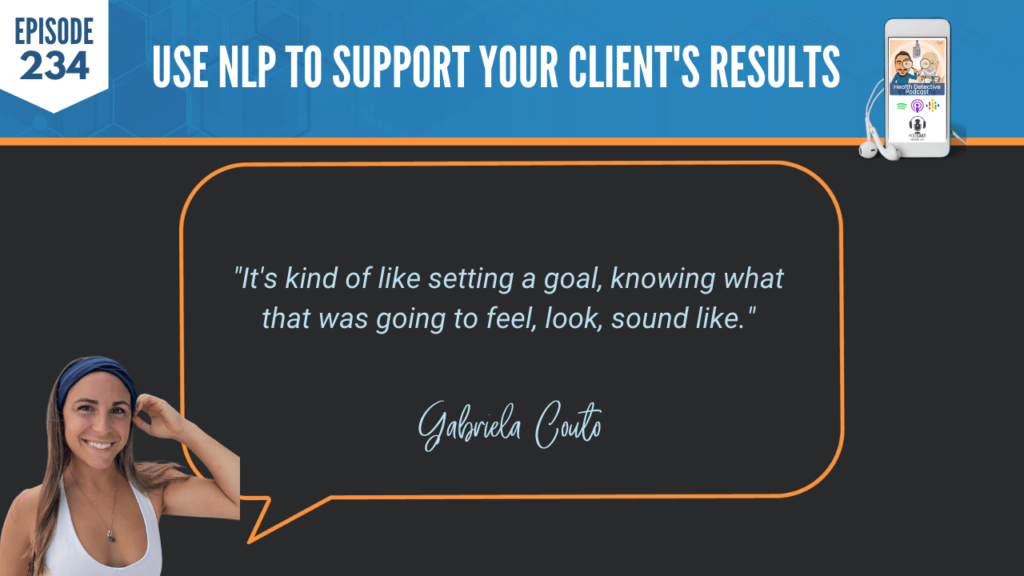
Then just encouraging them that you can feel this way following the protocol. We’ve seen it, done it, before. And the science is showing that these are the steps to get to that feeling. It’s kind of like setting a goal, knowing what that was going to feel, look, sound like.
For people who are more auditory, it’s being like, can you hear the thoughts that you would have in your head. Like how you would talk to yourself differently or what other people would say or compliment you?
Detective Ev: Yes, that’s what I was thinking.
Gabriela Couto: Like, wow, your skin looks brighter. Like, what have you done?
[00:31:57] Detective Ev: I’m like literally seeing this now. Well, that’s ironic, but that wasn’t the pun. Okay. That’s actually very funny because I’m literally saying this. I’m giving you my type basically, if we’ll call it that, while we’re speaking.
But if, in theory, at least for this, VAK in that order, in terms of what I should prioritize, I’m already thinking about what motivated me to do this. I don’t think anyone walks to the mirror with cystic acne and feels particularly great. Like I get that. But for me it was that personal thing first before anything else. Like I just wanted to look in the mirror and see, okay, this is good. This looks okay.
NLP: Question Clients’ Way to Learn on an Intake Form
But then the secondary thing is, yeah, you’re right, I actually enjoyed when people said your skin looks so good now. Or I tell people I had this, and they’re like, wow, I can never picture that. That feels good too.
But then even the feelings of like, well, you’ll feel so much more confident when you have this, and you’ll feel powerful in interactions because you’re not worried about that. And that is true, it didn’t not happen. But I can even feel my motivations and what they actually were. Now that I’m connecting this to that, it’s like, no, my motivations were clearly in that order of the visual, compliments, in the sense being the auditory, and then the feelings afterwards were actually just a byproduct of the other stuff. But ironically, that wasn’t the main thing.
And then yet, if you talk to a lot of people, they’ll speak from their communication language. I feel like so many people said to me, well, think about how confident you’re going to feel. I’m like, yeah, that’s great; that didn’t get me going. It was like, I just wanted to look in the mirror and see that and think, okay, this is good. This looks normal.
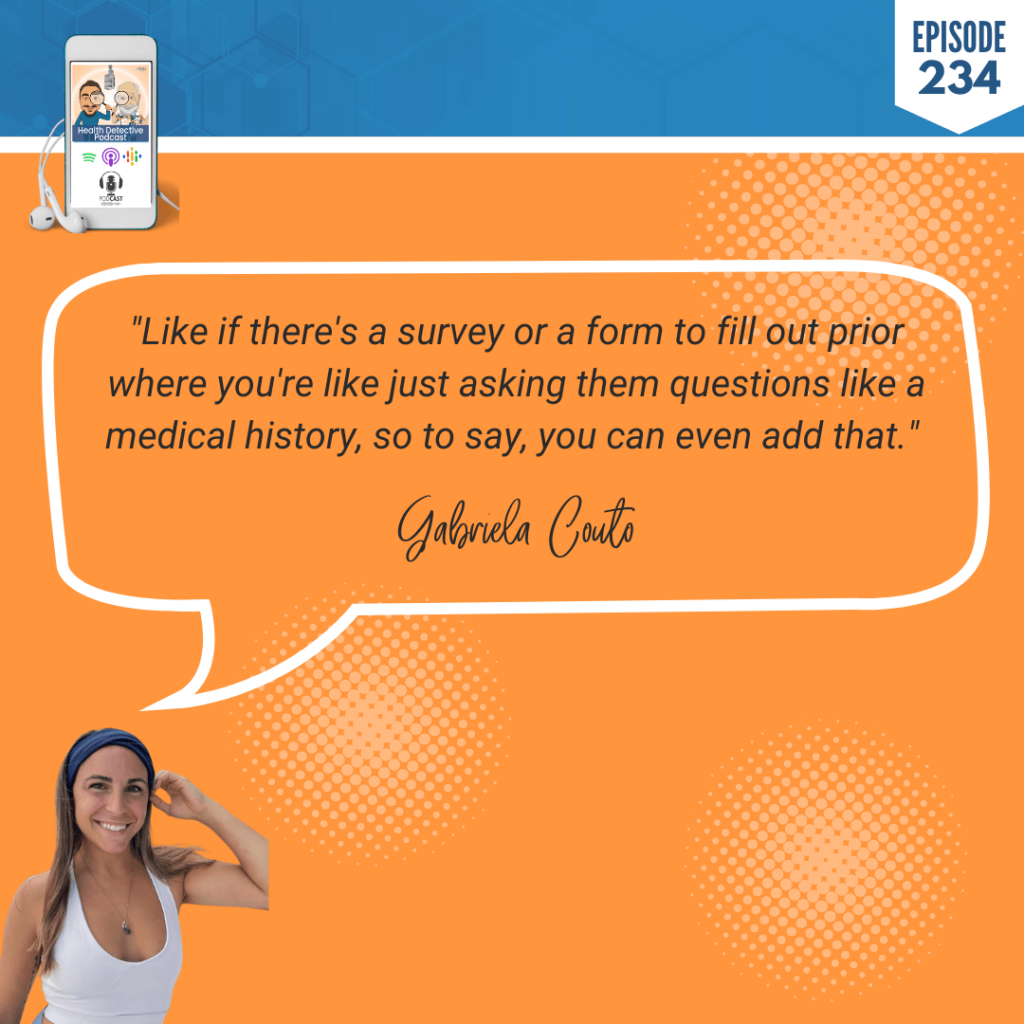
[00:33:26] Gabriela Couto: My mind goes to two different ways that you can actually start implementing this. Like if there’s a survey or a form to fill out prior where you’re like just asking them questions like a medical history, so to say, you can even add that. Like, are you visual, auditory, or kinesthetic; and like what are your goals? What is it that you want to feel? Look? And you can even have all options. What do you want to feel like?
Using NLP to Get Clients the Best Results
What do you want people to say or what are the thoughts that you want to start saying to yourself? Basically, just cover all VAKs, because to learn the best, it’s tapping on every single category, VAK.
And I think if you get that form ahead of time, you can start doing research. Okay, this is their goal, this is what they want to feel, look, sound like. Then you can talk to them in that way, kind of reiterating what they’re saying. You’re also giving them clarity of what they do want. Then it just brings in a stronger connection with your client.
[00:34:20] Detective Ev: Nice. I know NLP obviously goes deeper; I get that. But this is actually kind of immediately applicable today in my opinion. I don’t think anyone could listen to this and not get something from this, like use common sense basically.
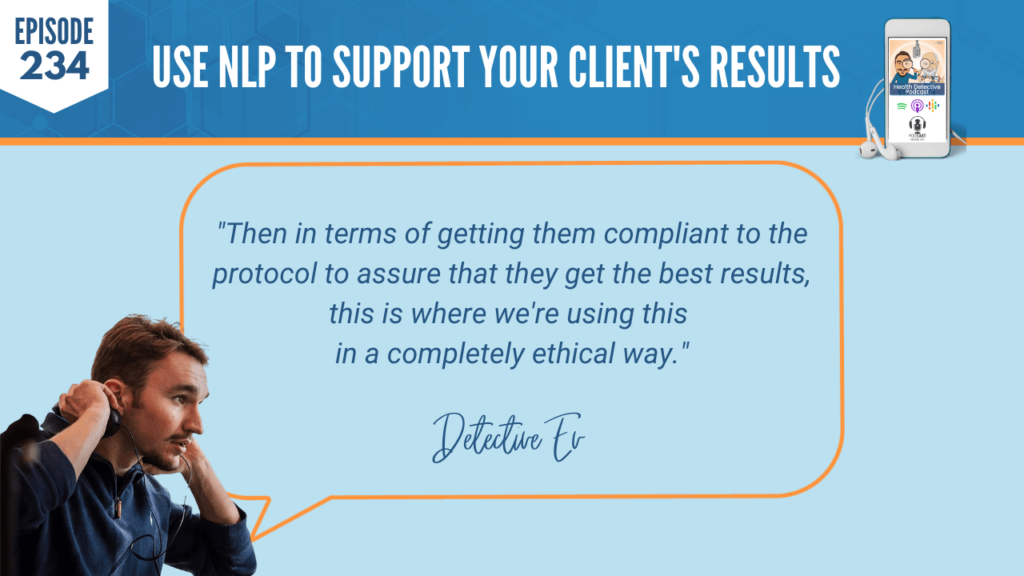
Now that you know that there’s a structure here, use the common sense to figure it out. Okay, are they working more with the visual side, the auditory side, or the kinesthetic side? Then in terms of getting them compliant to the protocol to assure that they get the best results, this is where we’re using this in a completely ethical way. We’re actually trying to boost the efficacy of the protocol that we gave to them.
They already paid for it, so it’s not like we’re trying to get money or something. You can actually use that to keep them on track and just use that common sense. How’s this person learning? Then constantly remind them, Ev, just imagine how good you’re going to look when this happens. Ev, you’re going to look great when this happens. Right? You’re not even thinking twice about that. It is so subconscious.
NLP: It’s Not Manipulation
Like as the person, if my coach was saying that every session, I’d be like, okay. Like, yeah, cool. Thank you for the reminder again. But that might sink a lot deeper.
Then I guess it’s hard to sometimes measure the results that you have with someone by actually doing this versus not doing this. But I certainly don’t see how it could hurt. I think this could actually help a lot. And it could help with sales calls too, if you know that the person’s a good fit, but they’re having some hesitancy. Reframing how you’re pitching to them or trying to close the sales call.
I’m not that advanced with this yet, but you could use the respective visual, auditory, or kinesthetic to actually sell that thing if you knew that it was going to help them. I think this can be immediately used by our community.
[00:35:45] Gabriela Couto: Oh, yeah, absolutely.
I think the biggest thing is the emotional intelligence, and it’s just being able to connect with that person. It’s kinda like putting yourself in their shoes. Like what is it that they’re seeking? What is it that they’re trying to strive for, and how can you best help them?

And going back to the previous conversation of the manipulation, it’s not manipulation. You’re supporting them in their goal in the best way that you know how by changing your language pattern. It also shows your character and that your heart is really there to serve them because you are trying to learn them.
NLP: Inspire Clients by Understanding Them
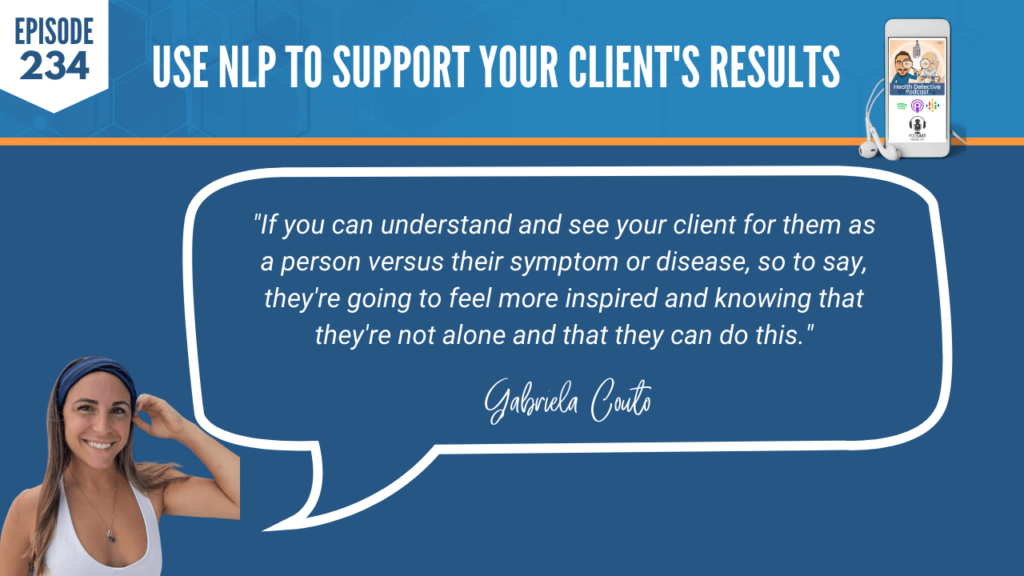
I think most people, they want to feel relatable. They want to feel seen; they want to be understood. And if you can understand and see your client for them as a person versus their symptom or disease, so to say, they’re going to feel more inspired and knowing that they’re not alone and that they can do this. They are motivated and they have that support that they need.
[00:36:41] Detective Ev: Yeah. Okay, cool.
So, with our last, like 11, 12 minutes here what I want to talk about obviously is your offerings for practitioners and then how you can actually help them with this. Obviously, the work that you do is more personal. It’s not like you’re coaching, per se, from my understanding, a practitioner in using these techniques with their clients, although I’m sure that can be done indirectly. But who is someone that you are passionate about helping?
I don’t want to answer that for you, but I think this would make sense and it’s worth mentioning. A lot of our practitioners, we have a subset of them that they know all the information, they know just as much stuff as all the practitioners out here that are killing it with our system, making six figures, helping tons of people, and yet they’ve barely taken two clients. And they take the clients, and it doesn’t work out. I know it’s because of what’s going on up here.
For those listening on audio only, I’m pointing to the head. It’s something that’s going on in the brain, in the mind. Can this work help them get over those limiting beliefs to maybe take the clients on and charge them accordingly when they literally have the same system that all these other successful practitioners have?
NLP: Dealing with Limiting Beliefs
[00:37:43] Gabriela Couto: Yeah, absolutely. And I think that’s a great way to identify it.
We do have a system, there is a system. How come the system works for some people and why the system doesn’t work for some people? I think that really comes down to those emotions that you have, the limited beliefs. If you think about the subconscious mind, the subconscious mind is to protect us. It filters the least and generalizes so much of the bits of information that we are receiving right now based on our trauma or our experiences.
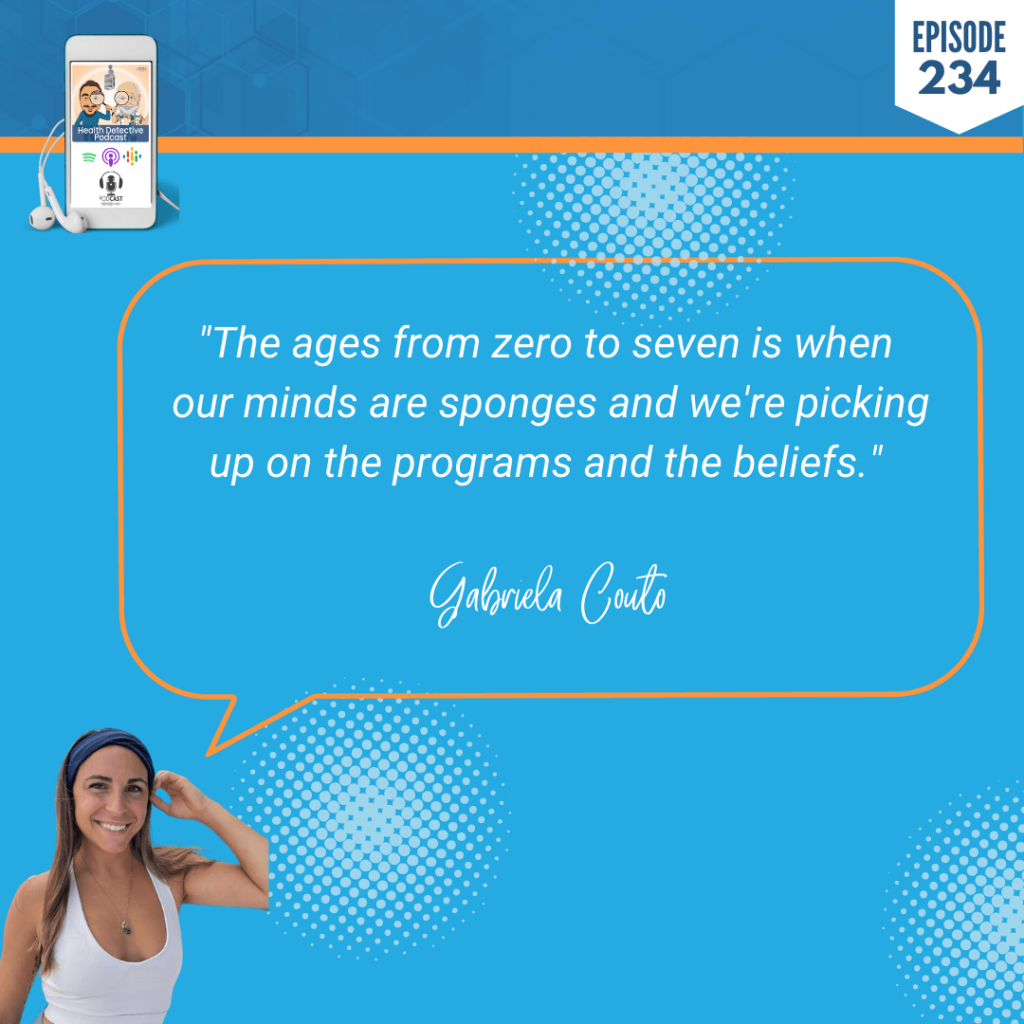
So, the ages from zero to seven is when our minds are sponges and we’re picking up on the programs and the beliefs. One of the biggest ones that a lot of people say is like, oh, you have to work hard for your money, or money doesn’t grow on trees. People have like this negative idea about what money is. Or like all rich people are bad.
Realizing where are these beliefs coming from and how is this affecting me in my work? Maybe those aren’t the best examples for this particular conversation. I think it’s the ability to communicate.
Some people not feeling understood or not feeling connected with themselves or having that confidence with themselves and what their abilities are. Where did that stem from and how is this holding you back from connecting with a client? Because you can only connect with people to the depth that you connect with yourself. You don’t have that connection with yourself, or you’re overwhelmed. And if we’re thinking on an energetic term, your energy isn’t like relating it to money, right?
NLP: The Energetic Exchange
It’s like where are you spending your energy? Where are you putting it? And if you are all clustered and spread apart, then you’re not harnessing yourself and you’re not being magnetic yourself.
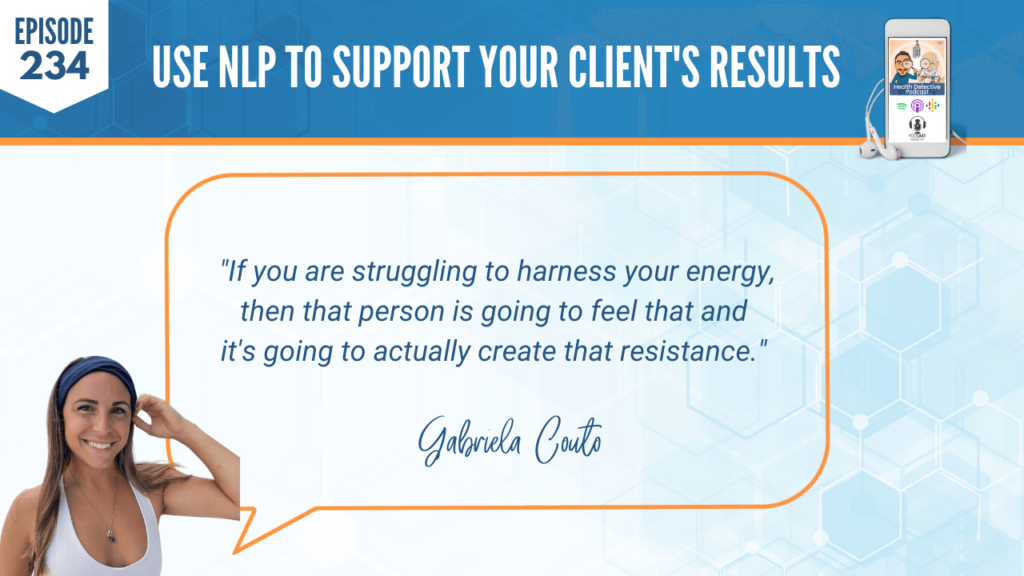
It’s going back to that intuition, like people can feel you, that’s just the way that our subconscious mind and our bodies work. It’s an energetic exchange. If you are struggling to harness your energy, then that person is going to feel that and it’s going to actually create that resistance. It’s also like that need, oh my God, I need a client. I need to do this. It’s the state of lack versus how can I serve this person? How can I support this person the best way possible? Putting them first versus you.
[00:39:56] Detective Ev: I totally agree with this because I’ve seen this phenomenon that connects totally with what you’re saying right now.
You would think, the longer that someone is trying to get clients or make money doing this, the better they would get somehow. You think you’d be learning something and yet, not all the time. Some of the time I have found the opposite is true. That it’s like the same people 2, 3, 4 years later are still struggling to get clients.
I feel like it connects to what you’re saying, where now they’re actually deepening this belief that they’re desperate for the client and they’re just conveying that energy in every call and every interaction. It’s one of the reasons that I’ve always recommended that, it depends on the person, but more often than not, I recommend that the people stay in their current job before taking a full plunge into FDN.
NLP: Energy Flows Where Attention Goes
I don’t want to overwork anyone; but make it to the point where it’s like you are doing so well at FDN, that it’s impractical to keep your full-time job because then you have that confidence in the back of your head. Like, oh, my bills get paid regardless of whether or not I get this client.
It’s also more ethical for the client cause you’re focusing now solely on people that you can serve, and you want to work with versus who you think could give you a paycheck. I don’t think anyone would do that so blatantly or maliciously, but you might be doing that subconsciously. You’re like, all right, well I can get this person to pay. I really need the money right now. And you’re selling someone that shouldn’t have been sold that’s not your ideal client anyway. Maybe you don’t even want to work with them.
[00:41:16] Gabriela Couto: I think that’s a huge concept. There comes a point where you are desperate, and you do need that. When you keep going on that cycle of like, oh my God, I haven’t closed a client, that’s going in your subconscious mind and those negative harsher emotions overpower the other grateful, gratitude nuances.
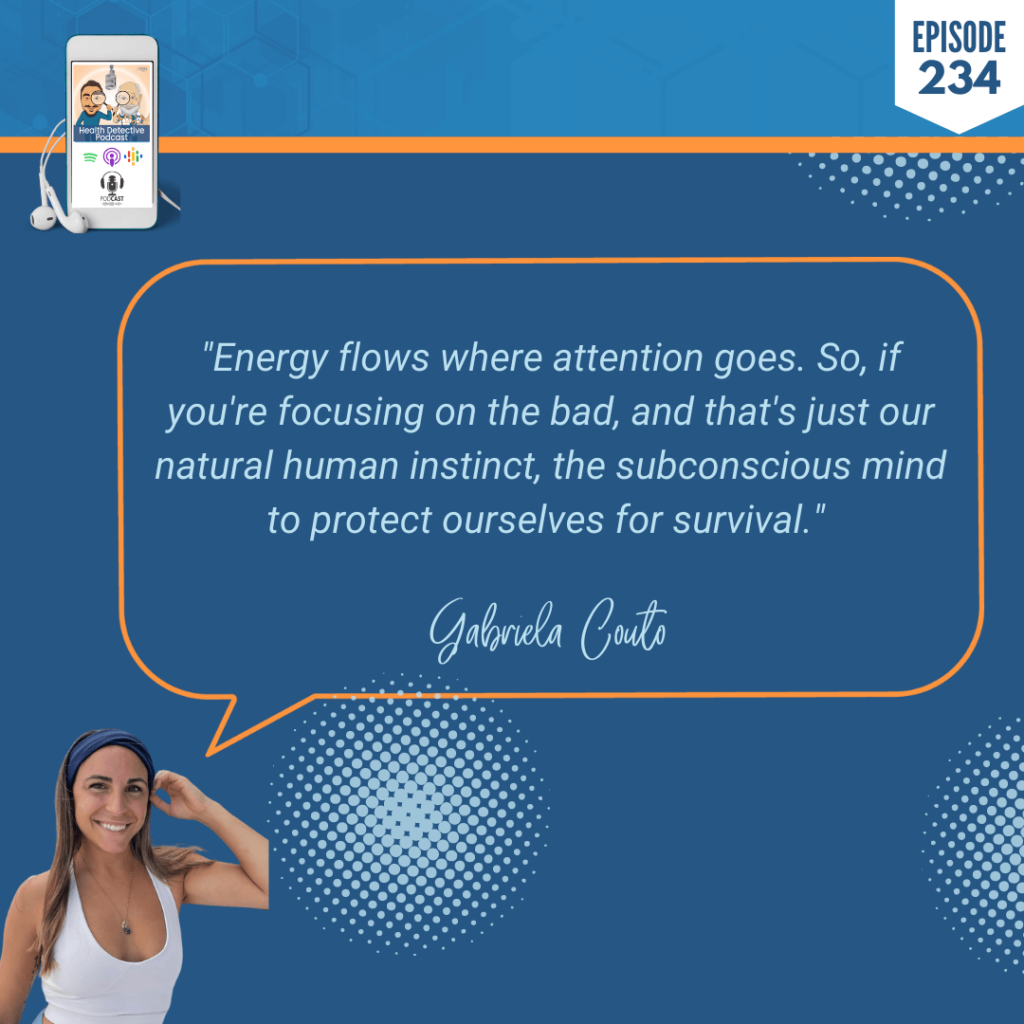
Energy flows where attention goes. So, if you’re focusing on the bad, and that’s just our natural human instinct, the subconscious mind to protect ourselves for survival. It’s being able to shift my energy, again, to put that perspective on how can I help this person the most?
[00:41:53] Detective Ev: So many practitioners making great livings with the system that you know it’s not the system. It’s almost like a college degree.
NLP: Personalize the System
Let’s take philosophy versus chemistry. I’m going somewhere with this. Philosophy, there are people that have made a lot of money in that area. There are famous philosophers. But obviously it is less applicable than chemistry. So, there are less people making philosophy than as chemists. My point is it is fair to say that there are systems that are better than not.
There are health coaching programs in our realm of health coaching that we’re in that are not great. It’s like 2% or 3% of the practitioners actually make any money with this. And you know what? They probably would’ve made money in anything that they did, whether it was real estate, wall street, lawyer, whatever, because they got it up here in the mind.
Yet, our system, I feel like, is the equivalent of the chemistry thing here because we can take someone who’s not that confident, who’s not that personable, and they can still make a living doing this. It’s a better system, so we know that that’s solid. But then again, there’s some people that just never get it together while others are getting like a hundred clients a year.
It’s one thing if we’re talking like the good people get three and the bad people get none. You’re talking about a hundred plus client differences on any given year. To me, that has to be consciousness. That has to be mindset at that point.
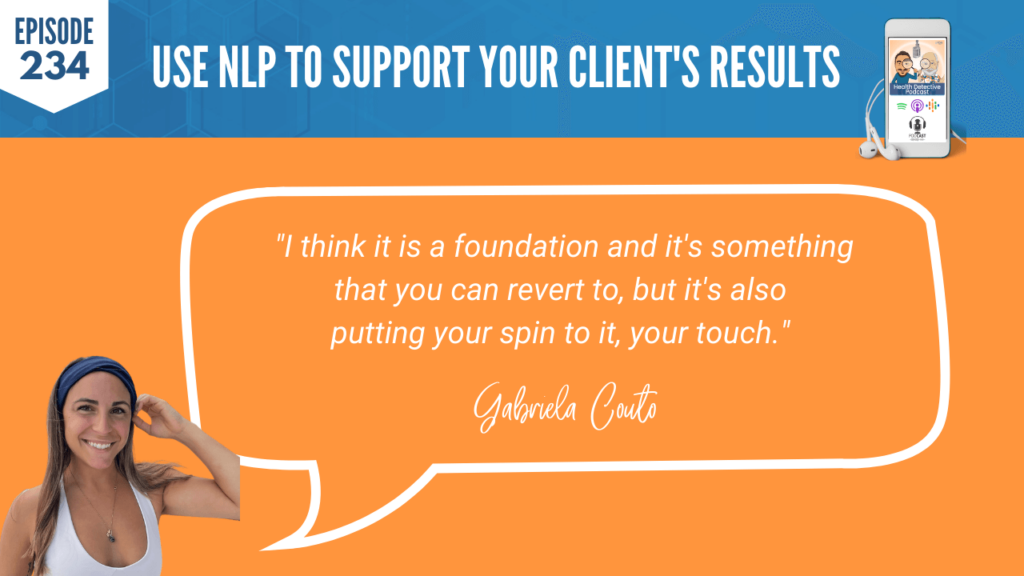
[00:43:02] Gabriela Couto: Yeah. Realizing that yes, we have a system. But just because the system works for one person doesn’t mean that exact system is going to work for another person. I think it is a foundation and it’s something that you can revert to, but it’s also putting your spin to it, your touch.
NLP: Synchronicity
Like, okay, what feels good for me to do? Do you face resistance to this system? And where do you feel that resistance to? Because that resistance is either an opportunity for growth to overcome, maybe it’s a fear or it’s just saying like there’s another way to do it and it’s being curious. Okay, how else can I do this and what’s going to work best for me?
[00:43:41] Detective Ev: Okay.
I think a lot of our practitioners might be stuck then because the other pattern I noticed with these people is their health might be 80% better, but it’s not like a hundred percent. I wonder if there’s not a limiting belief there that okay, FDN only got me to 80%, which most people would kill for, by the way guys, if they had chronic health issues. But you’re somehow invalidating yourself subconsciously thinking that, oh, since I didn’t get to a hundred percent, I’m not perfect. I can’t go and help other people.
[00:44:07] Gabriela Couto: Talking about synchronicity, that is a huge concept that has been coming up. It’s understanding that you have already arrived, that you are whole. And if you’re focusing on, I’m not healthy yet, or I’m not perfect, first define what is perfect for you. How do you know that you are operating at a hundred percent? It’s being able to identify that because then that’s when you can fill those holes.

But realizing that like you are already doing the work. I think a lot of it, honestly, comes down to health and emotions. Emotions are energy in emotion and it all merges together. It’s all entangled. You can’t have one without the other. You can’t have perfect health without having confident thoughts or harnessing your emotions.
Where to Find Gabriela Couto
Because you can be the healthiest person going on runs, eating the best foods, but how are your emotions? Are you reacting versus responding? It’s being able to see like, how do you even operate in society? How do you contribute to society? I think that’s also a big question.
And going back to like, how can you serve in the best way possible? How can you operate in your best way, not just physically and in health, but also to an energetic stance of your environment and those around you?
[00:45:27] Detective Ev: Awesome. Yeah, that definitely makes sense. I feel like this all connects kind of perfectly.
So, with that said, where can people find you? Is it still just Instagram? Do you have a website that they can go to? What do you prefer?
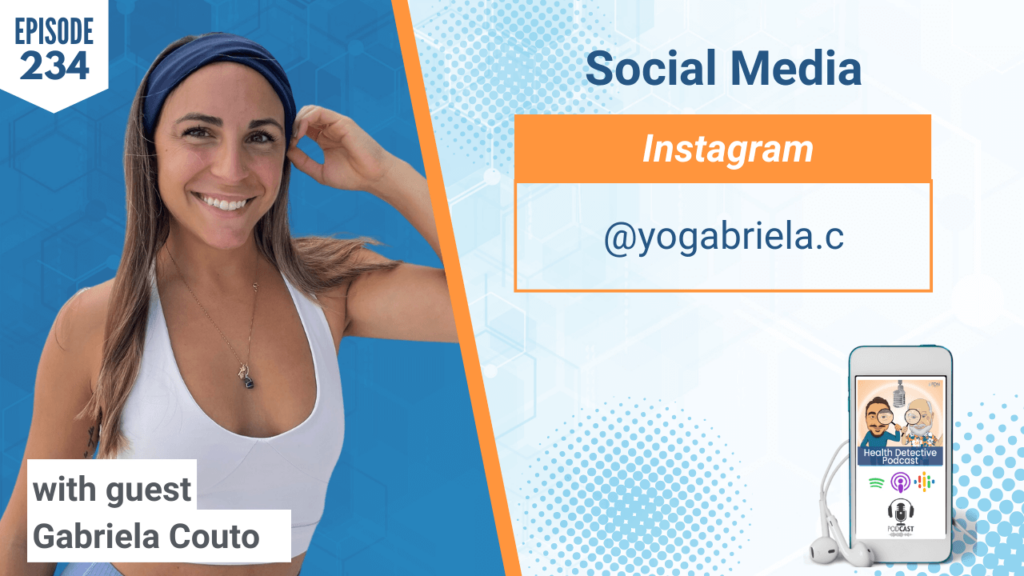
[00:45:37] Gabriela Couto: Yes. I am actually currently working on a project with another friend which I will send you the website if you’re open to that. But you can just direct them to my Instagram link, @yogabriela.c and we can connect from there.
[00:45:51] Detective Ev: Perfect. I will have that in the show notes.
And yeah, this stuff worked for me. The last part especially that you said about you can be eating all the right foods, doing this kind of stuff, but if that emotional thing is not a hundred percent addressed or at least mostly addressed, that can be a hindrance. It’s not that I even didn’t want to accept it, I thought, yeah, that makes sense, but I didn’t realize how deep it can go. I think for a lot of us that might be the case.
So, if you intuitively feel like there’s something here, I would definitely reach out to Gabriela.
Conclusion
Don’t forget to try these things with your clients, the VAK, visual, auditory, and kinesthetic.
But thanks for coming on and sharing completely different knowledge with us today, teaching us about the dangers of fluoride last time and now how to work with clients this time. I appreciate it.
[00:46:27] Gabriela Couto: Yeah, absolutely. Thanks for having me, Evan.
You can always visit us at functionaldiagnosticnutrition.com.
For more informational health concentrated podcasts like this one, go to functionaldiagnosticnutrition.com/health-detective-podcast/.
To learn more about us, go to functionaldiagnosticnutrition.com/about-fdn-functional-testing/.

